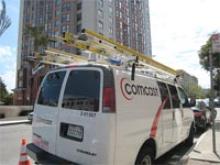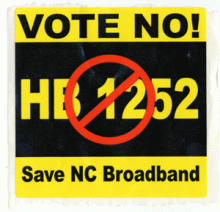The second line of
Rachel Carter's story at TimesCall.com captures the reason we care about community broadband networks:
But others argued that it’s not about whether the city will jump into the cable or Internet business; it’s about giving the city options and giving voters a choice.
Longmont, Colorado, will have a question on its November ballot asking whether the city should have the right to offer retail broadband services. This referendum is a requirement of Colorado state law (passed in June 2005 --
more details about that law from Baller.com [pdf]) for communities that want to offer such services to their community.
A number of people spoke at the city council meeting before they unanimously voted to put the question on the ballot. Responding to some who opposed giving citizens a chance to choose, one Council Member came up with quite the apt phrase:
Councilman Sean McCoy said the Comcast representatives and Denver attorneys who spoke against the ballot question tried to “put a shadow of a doubt” on it by using “red herring” issues. “I believe the concerns are more of an issue of ’not in my monopoly’ more than anything else,” he said.
Longmont has given the private sector plenty of chances to offer the broadband that citizens want - but they have failed to meet community needs. A number of private companies have tried to use the city's assets to build a wireless network: As
detailed here, Kite Networks contracted with the city in 2006 to build a wireless network but ran out of money. In 2007, Gobility gave it a shot but also ran out of money.
In stepped DHB, who completed the network.
It is not clear what has happened to DHB, but
this suggests that many remain dissatisfied:
All council members supported the ballot question, although Mayor Roger Lange and Councilwoman Mary Blue questioned what the city may choose to do in the future.








